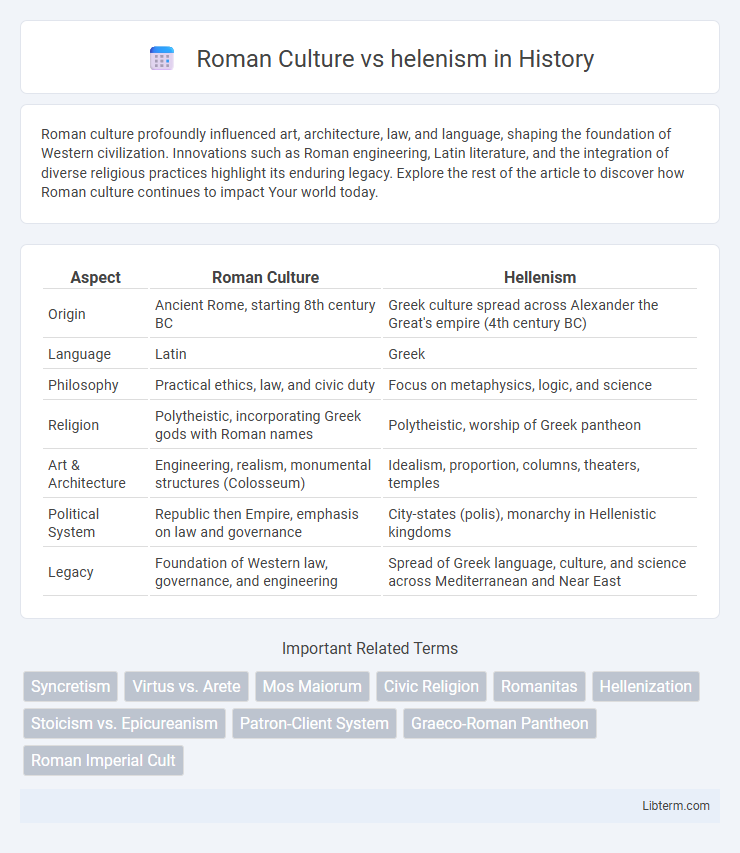Roman culture profoundly influenced art, architecture, law, and language, shaping the foundation of Western civilization. Innovations such as Roman engineering, Latin literature, and the integration of diverse religious practices highlight its enduring legacy. Explore the rest of the article to discover how Roman culture continues to impact Your world today.
Table of Comparison
| Aspect | Roman Culture | Hellenism |
|---|---|---|
| Origin | Ancient Rome, starting 8th century BC | Greek culture spread across Alexander the Great's empire (4th century BC) |
| Language | Latin | Greek |
| Philosophy | Practical ethics, law, and civic duty | Focus on metaphysics, logic, and science |
| Religion | Polytheistic, incorporating Greek gods with Roman names | Polytheistic, worship of Greek pantheon |
| Art & Architecture | Engineering, realism, monumental structures (Colosseum) | Idealism, proportion, columns, theaters, temples |
| Political System | Republic then Empire, emphasis on law and governance | City-states (polis), monarchy in Hellenistic kingdoms |
| Legacy | Foundation of Western law, governance, and engineering | Spread of Greek language, culture, and science across Mediterranean and Near East |
Origins of Roman Culture and Hellenism
Roman culture originated primarily from a blend of indigenous Italic traditions and influences from the Etruscans and Latins, emphasizing practical governance, legal systems, and military organization. Hellenism emerged from the spread of Greek culture following Alexander the Great's conquests, marked by the fusion of Greek, Egyptian, Persian, and Indian elements promoting philosophy, arts, and sciences. The interaction between Roman culture and Hellenism significantly shaped Roman art, religion, and intellectual life, integrating Greek ideals within a pragmatic Roman framework.
Key Philosophical Differences
Roman culture emphasized practical ethics and law, valuing duty, discipline, and social order as foundations of moral behavior. Helenistic philosophy, especially through schools like Stoicism and Epicureanism, focused more on individual happiness, virtue, and understanding the nature of existence. While Roman thought prioritized collective responsibility and civic duty, Hellenistic philosophy pursued personal tranquility and intellectual exploration.
Language and Literature: Latin vs. Greek Influence
Roman Culture was deeply influenced by Hellenism, with Latin literature reflecting Greek themes, styles, and genres while maintaining unique Roman values and pragmatism. Latin authors such as Virgil and Ovid adapted Greek myths and epic forms but emphasized Roman ideals of duty and heroism, illustrating a fusion of linguistic tradition and cultural identity. The Greek language remained the lingua franca of intellectual and artistic expression in the Eastern Roman Empire, preserving classical philosophical and literary heritage alongside the evolving Latin literary canon of the West.
Art and Architecture: Styles and Innovations
Roman culture integrated Hellenistic art forms while introducing monumental architectural innovations such as concrete construction, the arch, and the dome, exemplified by the Colosseum and Pantheon. Hellenistic art emphasized naturalism, dynamic movement, and emotional expression with sculptural masterpieces like the Laocoon Group and Pergamon Altar. Roman art and architecture focused on practicality and imperial propaganda, combining Greek aesthetics with engineering prowess to create vast public spaces and enduring infrastructure.
Religion and Mythology: Gods and Practices
Roman culture adapted many aspects of Hellenistic religion and mythology, integrating Greek gods with Latin counterparts, such as Zeus becoming Jupiter and Aphrodite transforming into Venus. Roman religious practices emphasized rituals, priesthoods like the Pontifex Maximus, and state-sponsored ceremonies aimed at maintaining pax deorum, or the peace of the gods. While Hellenism embraced philosophical interpretations of divine figures, Roman religion remained pragmatic, focusing on auspices, auguries, and household worship to secure divine favor.
Social Structure and Citizenship
Roman culture featured a rigid social hierarchy with distinct classes such as patricians, plebeians, and slaves, while citizenship was a crucial element granting legal rights and political participation predominantly to freeborn males. In contrast, Hellenism emphasized a more fluid social structure, often integrating diverse peoples across its vast territories, with citizenship varying significantly between city-states but generally linked to active participation in civic life. The Roman model institutionalized citizenship as a unifying tool for empire-building, expanding it progressively to conquered peoples, whereas Hellenistic societies focused more on cultural assimilation and local autonomy within their social frameworks.
Political Thought and Governance
Roman political thought emphasized practical governance, codified laws, and the balance of powers within the Republic, fostering institutions like the Senate and magistracies to maintain order and civil control. Hellenistic political thought, influenced by Greek philosophy, explored ideal forms of government and the role of rulers with a focus on monarchy, tyranny, and the polis, emphasizing ethical leadership and the concept of civic virtue. Roman governance integrated Hellenistic ideas but prioritized pragmatic administration and legal frameworks to sustain empire-wide stability and expansion.
Military Traditions and Values
Roman military traditions emphasized discipline, organization, and a strict hierarchy, with legions playing a central role in their conquests and defense strategies. In contrast, Hellenistic military practices prioritized the phalanx formation and combined arms tactics influenced by Alexander the Great's campaigns. Roman values celebrated duty, loyalty to the state, and practical engineering skills, while Hellenism reflected a blend of Greek ideals, including honor and individual heroism, shaped by the diverse cultures within Alexander's empire.
Everyday Life: Customs and Traditions
Roman culture emphasized practical and communal aspects of everyday life, with customs centered around family loyalty, religious rituals, and public festivals such as Saturnalia that reinforced social hierarchies. Helenistic culture, influenced by Greek traditions, promoted intellectual pursuits and artistic expression, with daily life often revolving around gymnasiums, philosophical discussions, and elaborate banquets celebrating gods and heroes. Both cultures valued religious observance but differed in social organization and the integration of cultural practices into daily routines.
Legacy and Lasting Impact on Western Civilization
Roman culture shaped Western legal systems, engineering, and governance, embedding principles like republicanism and codified law into modern institutions. Hellenism influenced Western philosophy, arts, and sciences, introducing foundational ideas from thinkers such as Plato and Aristotle and advancing scientific inquiry and artistic expression. Together, Roman pragmatism and Hellenistic intellectualism forged the cultural and intellectual bedrock of Western civilization, enduring in modern political structures, education, and cultural values.
Roman Culture Infographic

 libterm.com
libterm.com